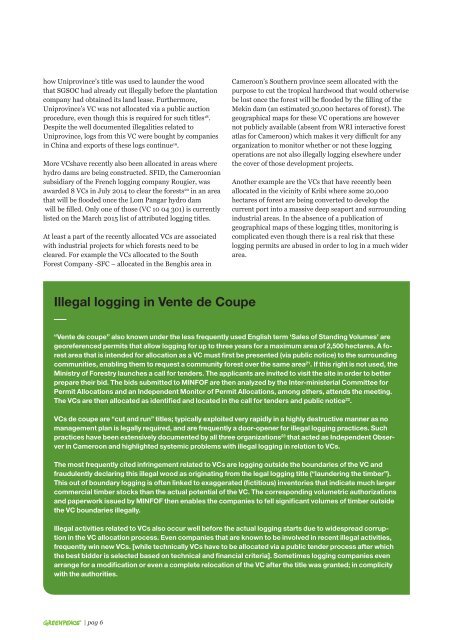CCT’S TIMBER TRADE FROM CAMEROON TO EUROPE
ZioqW
ZioqW
You also want an ePaper? Increase the reach of your titles
YUMPU automatically turns print PDFs into web optimized ePapers that Google loves.
how Uniprovince’s title was used to launder the wood<br />
that SGSOC had already cut illegally before the plantation<br />
company had obtained its land lease. Furthermore,<br />
Uniprovince’s VC was not allocated via a public auction<br />
procedure, even though this is required for such titles 18 .<br />
Despite the well documented illegalities related to<br />
Uniprovince, logs from this VC were bought by companies<br />
in China and exports of these logs continue 19 .<br />
More VCshave recently also been allocated in areas where<br />
hydro dams are being constructed. SFID, the Cameroonian<br />
subsidiary of the French logging company Rougier, was<br />
awarded 8 VCs in July 2014 to clear the forests 20 in an area<br />
that will be flooded once the Lom Pangar hydro dam<br />
will be filled. Only one of those (VC 10 04 301) is currently<br />
listed on the March 2015 list of attributed logging titles.<br />
At least a part of the recently allocated VCs are associated<br />
with industrial projects for which forests need to be<br />
cleared. For example the VCs allocated to the South<br />
Forest Company -SFC – allocated in the Bengbis area in<br />
Cameroon’s Southern province seem allocated with the<br />
purpose to cut the tropical hardwood that would otherwise<br />
be lost once the forest will be flooded by the filling of the<br />
Mekin dam (an estimated 30,000 hectares of forest). The<br />
geographical maps for these VC operations are however<br />
not publicly available (absent from WRI interactive forest<br />
atlas for Cameroon) which makes it very difficult for any<br />
organization to monitor whether or not these logging<br />
operations are not also illegally logging elsewhere under<br />
the cover of those development projects.<br />
Another example are the VCs that have recently been<br />
allocated in the vicinity of Kribi where some 20,000<br />
hectares of forest are being converted to develop the<br />
current port into a massive deep seaport and surrounding<br />
industrial areas. In the absence of a publication of<br />
geographical maps of these logging titles, monitoring is<br />
complicated even though there is a real risk that these<br />
logging permits are abused in order to log in a much wider<br />
area.<br />
Illegal logging in Vente de Coupe<br />
“Vente de coupe” also known under the less frequently used English term ‘Sales of Standing Volumes’ are<br />
georeferenced permits that allow logging for up to three years for a maximum area of 2,500 hectares. A forest<br />
area that is intended for allocation as a VC must first be presented (via public notice) to the surrounding<br />
communities, enabling them to request a community forest over the same area 21 . If this right is not used, the<br />
Ministry of Forestry launches a call for tenders. The applicants are invited to visit the site in order to better<br />
prepare their bid. The bids submitted to MINFOF are then analyzed by the Inter-ministerial Committee for<br />
Permit Allocations and an Independent Monitor of Permit Allocations, among others, attends the meeting.<br />
The VCs are then allocated as identified and located in the call for tenders and public notice 22 .<br />
VCs de coupe are “cut and run” titles; typically exploited very rapidly in a highly destructive manner as no<br />
management plan is legally required, and are frequently a door-opener for illegal logging practices. Such<br />
practices have been extensively documented by all three organizations 23 that acted as Independent Observer<br />
in Cameroon and highlighted systemic problems with illegal logging in relation to VCs.<br />
The most frequently cited infringement related to VCs are logging outside the boundaries of the VC and<br />
fraudulently declaring this illegal wood as originating from the legal logging title (“laundering the timber”).<br />
This out of boundary logging is often linked to exaggerated (fictitious) inventories that indicate much larger<br />
commercial timber stocks than the actual potential of the VC. The corresponding volumetric authorizations<br />
and paperwork issued by MINFOF then enables the companies to fell significant volumes of timber outside<br />
the VC boundaries illegally.<br />
Illegal activities related to VCs also occur well before the actual logging starts due to widespread corruption<br />
in the VC allocation process. Even companies that are known to be involved in recent illegal activities,<br />
frequently win new VCs. [while technically VCs have to be allocated via a public tender process after which<br />
the best bidder is selected based on technical and financial criteria]. Sometimes logging companies even<br />
arrange for a modification or even a complete relocation of the VC after the title was granted; in complicity<br />
with the authorities.<br />
| pag 6



